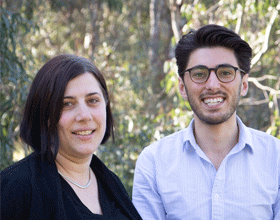
Orygen staff members have contributed a chapter to a new book that examines the current practice and future challenges of peer work in the mental health, human services and disability sectors in Australia
The book, titled Peer Work in Australia – a new future for mental health, was launched by the Federal Minister for Health, the Hon. Greg Hunt MP, at Parliament House in Canberra on 12 September.
Orygen’s Mr Nicholas Fava and Dr Magenta Simmons contributed a chapter on peer work in youth mental health.
Titled Youth peer work: Building a strong and supported youth peer workforce, the chapter was written in collaboration with a group of peer workers (Rose Randall, Hamilton Kennedy, Jesse Olsen, Emily Matenson, and Sarah Fitzpatrick). The chapter focuses on the critical components of youth peer work and includes case studies of people in youth peer work positions and recommendations for the future of the youth peer work workforce.
Dr Simmons said she hoped the chapter would provide youth mental health services, service users and caregivers across Australia an insight into what youth peer work is and what it might offer other young people.
“Youth peer workers draw upon their lived experiences of mental ill-health, so are uniquely placed to provide young people seeking support for mental ill-health with stories of hope and recovery,” Dr Simmons said.
“In writing this chapter we collaborated with youth peer workers on what should be included, and this included youth peer workers sharing examples of their own work.”
Mr Fava said peer workers shouldn’t be seen as a therapist or clinician. “They have a unique skill set that should be respected alongside all the expertise in the workforce,” he said. “Like any member of the workforce they need to be provided professional development and they need to be valued for their different approach.”
Peer Work in Australia – a new future for mental health was co-produced by 29 peer workers, advocates and allies each with lived experience of mental ill-health from across Australia.
Production of the chapter by Dr Simmons and Mr Fava was funded by Dr Simmons’ receipt of an Early Career Research Project Grant from the Society for Mental Health Research in 2016.